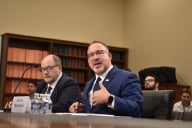You have /5 articles left.
Sign up for a free account or log in.
The Department of Education rejected two recent calls to improve its monitoring of the financial health of colleges and universities -- despite its failure to predict institutions' closure in half of cases since 2010-11.
A Government Accountability Office report released Wednesday found that the risk measure the department uses to assess colleges' financial health is badly out of date. While the department agreed to improve communication about how it calculates that measure, it rejected a call to improve the metric. And the Office of Federal Student Aid separately turned down recommendations to strengthen the data it collects for oversight of institutions.
Both developments came weeks after Secretary Betsy DeVos and her Federal Student Aid chief, A. Wayne Johnson, announced with few accompanying details that FSA was taking a more "comprehensive" approach to oversight. Departmental oversight applies to all colleges that receive federal aid, but those seeking more scrutiny have been concerned about for-profit institutions and some financially troubled small private nonprofit colleges at risk of closure.
Clare McCann, the deputy director of higher ed policy at New America and a former Obama Department of Education official, submitted a raft of recommendations to the department on how it could improve data collection. She said the inaction on recommended changes in both cases points to longstanding issues at Federal Student Aid as much as lack of interest in oversight at the department.
"It's a collision of inertia at FSA and a lack of leadership and accountability from the department," she said. "It just guarantees nothing is going to change."
Federal Student Aid conducts annual reviews of colleges and universities' financial health; those that don't meet standards must receive additional oversight and in some cases are required to provide financial guarantees to the department in case of closure. The GAO looked at the metric FSA uses to grade institutions' financial health, known as the financial composite score, and found that it has had an inconsistent performance because its underlying formula hasn't changed since 1997 -- meaning it fails to reflect changes in standard accounting practices. The result, GAO says, is half the colleges that have closed since the 2010-11 school year received passing scores on their previous assessment.
The GAO's report called for the department to update the metric -- a recommendation that the department rejected in its response. Matthew Sessa, the deputy chief operating officer at FSA, wrote in a response to the recommendations that the report hadn't demonstrated how changes to accounting standards had made the composite score less reliable. He added that the department would provide additional guidance to colleges on how it calculates the composite score.
Ben Miller, the senior director for postsecondary education at the Center for American Progress, said it was surprising to see a federal agency decline a recommendation from GAO. But he said the composite scores themselves have inherent lag time as a measure of an institution's financial health. For-profit colleges have six months to turn in a financial audit to the department, and not-for-profits have nine months to do so.
"You’re already talking about a very lengthy delay by the time you get that audit," he said. "The thing I worry about is a very abrupt hit to an institution's finances that causes problems. If you’re a hand-to-mouth nonprofit and you miss your enrollment target this fall, the department’s not going to see it for almost two years."
Miller said the composite scores are useful as long-term indicators but said they should be combined with a broader set of indicators tracking precipitous changes in an institution's financial health.
The department has taken some steps to expand its scrutiny of colleges beyond the financial audits that its composite scores are based on. It's begun to scrutinize colleges owned by the same private equity firms to consider whether they should be evaluated as a single entity to find financial risks that would be missed at an individual school level. And in 2014 it set up a special division devoted to monitoring large institutions with campuses in multiple locations. That division now monitors 47 companies operating for-profit institution. But the GAO found that most colleges that closed in the past five years were smaller institutions with an enrollment of fewer than 500 students.
And it said that some institutions have figured out how to game the composite score by taking on large amounts of short-term debt to boost their scores -- Corinthian Colleges, for example, the for-profit chain that went under in 2015, repeatedly took out large short-term loans at the end of its fiscal year to boost its scores and then promptly repaid the loans.
McCann said all of those tools fit within a broader framework of federal oversight of the sector. McCann made 12 recommendations as part of a public comment period preceding FSA's plans to integrate several existing data sets into one large database tracking characteristics on the financial health of colleges and universities. Among those recommendations, she argued that the department should track any sanctions on higher ed institutions by law enforcement agencies, that it should require publicly traded institutions to submit SEC filings directly to the department, and that colleges should identify all programs offered entirely online. All 12 recommendations were rejected, most because the department found certain information was already tracked elsewhere or because it said they would be considered as part of a "future enhancement."
The takeaway, McCann said, was that FSA is not seriously re-evaluating what information about colleges it collects, even as it takes long-overdue action to streamline existing data. But she said momentum is building outside the office to push for serious changes in oversight of colleges.
"There is mounting pressure on FSA from people outside the department to focus more on this kind of thoughtful, timely oversight work that goes beyond the sort of check-the-box compliance they often do," she said.








